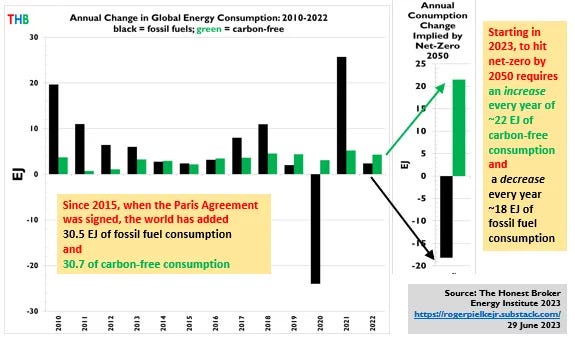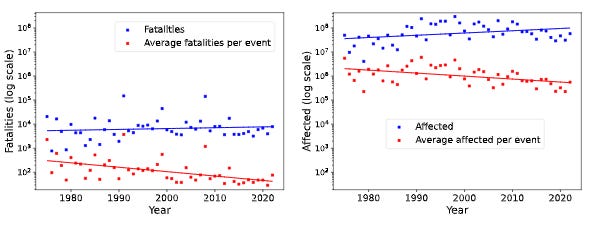This week the 28th Conference of Parties (COP28) to the UN Framework Convention on Climate Change kicks off in Dubai, United Arab Emirates. Accompanying the conference will be an onslaught of climate news, information, reporting, propaganda, misinformation, marketing, spin, science and the science-like. Today, I share some relevant news items that you are almost assuredly not going to find anywhere else.
Global Climate Policy Hasn’t Made Much Difference on Energy Transitions
That’s the conclusion of a brilliant new paper published this week by Masahiro Suzuki, Jessica Jewell and Aleh Cherp, titled — Have climate policies accelerated energy transitions? Historical evolution of electricity mix in the G7 and the EU compared to net-zero targets.
Here is what they report:
Climate policies are often assumed to have significant impacts on the nature and speed of energy transitions. To investigate this hypothesis, we develop an approach to categorise, trace, and compare energy transitions across countries and time periods. We apply this approach to analyse electricity transitions in the G7 and the EU between 1960 and 2022, specifically examining whether and how climate policies altered the transitions beyond historical trends. Additionally, we conduct a feasibility analysis of the required transition in these countries by 2035 to keep the global temperature increase below 1.5°C. We find that climate policies have so far had limited impacts: while they may have influenced the choice of deployed technologies and the type of transitions, they have not accelerated the growth of low-carbon technologies or hastened the decline of fossil fuels. Instead, electricity transitions in the G7 and the EU have strongly correlated with the changes in electricity demand throughout the last six decades. In contrast, meeting the 1.5°C target requires unprecedented supply-centred transitions by 2035 where all G7 countries and the EU must expand low-carbon electricity five times faster and reduce fossil fuels two times faster on average compared to the rates in 2015–2020. This highlights the insufficiency of incremental changes and the need for a radically stronger effort to meet the climate target.
Their analysis is consistent with my much simpler assessment from last June, where I concluded that the energy transition has not yet started, illustrated in the figure below.
The Suzuki et al. analysis is important because it puts some rigorous analysis to the question of the impacts of global climate policy on fossil fuels and carbon dioxide emissions in the G7 and EU.
There will be strong incentives this week for those participating in and cheering on COP28 to claim that the UNFCCC, and the Paris Agreement specifically, have already resulted in huge changes in the global energy system trajectory.1 Focus on data and not spin, and thanks to Suzuki et al. we have the data.
Floods Have Become Less Deadly
That’s the conclusion of a new pre-print analysis of global flood impacts from 1975 to 2022. The study finds that even as global population doubled from 4 billion to 8 billion, the overall number of fatalities and people affected showed little change and per-event fatalities and those affected decreased. That is great news!
Don’t even think about trying to discern a climate signal in these trends — climate and weather data are where to look for trends in weather and climate. What we can say with some certainty, as this study confirms many others, is that the world has dramatically improved its adaptive capacity when it comes to extreme weather.
Good news is not welcome in this space, I get it. But the evidence shows comprehensively that when it comes to extreme weather and climate events, the human and economic impacts are not getting worse, despite the ever-present drumbeat of doom.
Why “Loss and Damage” Cannot Succeed

The notion of “loss and damage” under the UNFCCC architecture is intended to provide a mechanism for specific compensation to be paid from rich countries with large historical emissions to poor countries that have experienced weather and climate disasters. The underlying basis for such compensation is that the rich countries caused the “loss and damage” and thus have an obligation to compensate those who they have harmed — simple enough.
The dueling comments from Nature Climate Change shown above illustrate a deep divide among experts as to the meaningfulness of so-called “event attribution” methodologies which have been developed specifically to apportion responsibility for extreme events to emissions of carbon dioxide, and in some case, to specific emitters. You can read my views on these methodologies in more detail here.
“Loss and damage” is a predictable result of the gerrymandering of “climate change” under the UNFCCC. Incredibly and bafflingly, the UNFCCC and Intergovernmental Panel on Climate Change (IPCC) each operate under different definitions of climate change. I’ve known this for decades and I continued to be amazed by the inconsistency, which creates problems for science and policy.
Under the IPCC, “climate change” refers to any long-term change in the statistics of weather or climate. The UNFCCC defines “climate change” only in terms of those changes that can be attributed to greenhouse gas emissions. These different definitions have set the stage for bureaucratic complexities and scientific impossibilities.
Even more uncomfortable is that in turning adaptation and disaster risk reduction into attribution modeling exercises takes the focus of “loss and damage” away from those affected by weather and climate impacts and into universities and research institutes in rich countries. It is climate colonialism via scientific authoritarianism, and it stinks.
Read more about this and why it matters:
Pielke Jr, R. A. (2005). Misdefining “climate change”: consequences for science and action. Environmental Science & Policy, 8(6), 548-561.
Boondoggle, Diplomacy, Both, Neither?
The graph above comes via Javier Blas (@JavierBlas) of Bloomberg, and it shows that COP28 is expecting 70,000 participants, more than double those of COP27. Climate is now a full-scale industry, with fortunes and careers to be made, and perhaps lost. That in itself is not necessarily good or bad — health, defense, finance and so on are also industries. It goes with the territory of being an important policy and political issue.
Along with the climate industrial complex comes massive vested interests, ranging from the financial to the professional to the political. That makes it difficult to sort out facts from fluff, science from spin. The moral overlay on climate — fossil fuels, nuclear are bad while solar and wind are virtuous — means that different standards are applied to different experts for common practices like conflict of interest disclosures. That makes getting reliable information even more challenging.
The UNFCCC process, even with its architectural flaws and traveling circus, is important nonetheless and the Paris Agreement architecture involving a global Stocktake of progress with respect to commitments can be an important factor in accountability and progress.2 But just as with other industrial complexes, the climate industrial complex can facilitate or present an obstacle to progress. It is up to all of us to uphold accountability to community norms and maintain standards of scientific integrity, even in pursuit of a noble cause.
More to Read
I’ve gone on long enough for today. To close, here are some things to read I found interesting over the past week:
Alexandre Alphonso: Education and the electoral geography of the radical right in the Netherlands
Kerry Emanuel (who has said different on many occasions, is now apparently in line with the IPCC): “"At present, there is little scientific consensus about trends in global or regional TC activity, either in the past, as detected in observations or in climate model simulations, or in the future as our climate continues to change."
Ju et al. 2023. Japanese experts are much less optimistic about the possibilities of net-zero policies than are other IAM/IPCC experts, suggesting a need for greater diversity among experts mapping scenario futures.
Bschir et al. 2023. Along these lines — on the importance of values diversity in expert advice.
Katherine Eban is en fuego: Secret Warnings About Wuhan Research Predated the Pandemic
Finally, Clark et al. 2023 on scientists who engage in scientific censorship. It’s real, and a problem. Oh the stories I can tell.
Thanks for reading! I welcome your comments, questions, recommendations and critique. THB is a community and is made possible with your support. Please like and share, and do invite others to join in the conversation. All are welcome. Coming soon — a round up of the 2023 hurricane season, a look back at when the climate was perfect, my thoughts on the effective use of math in policy research (from my recent UCLA talk) and the 5 most uncomfortable facts about the climate debate. December is going to be fun!
Such claims are also very convenient for explaining away RCP8.5 as now implausible due to the huge progress we’ve made (false) rather than being flawed from the start (true).
In 1998, Michele Betsill and I anticipated the logic of the Paris Agreement in this paper: Betsill, M. M., & Pielke, R. A. (1998). Blurring the boundaries: domestic and international ozone politics and lessons for climate change. International Environmental Affairs, 10, 147-172.








If the trend continues COP 2037 will have over 4 billion attendees.
Thank you for the updates, and I hope you and your family had a safe and warm Thanksgiving.
A request: My attempts to open the Ju et al paper on possibilities of net-zero policies took me to the link for the Kerry Emanuel paper. Could you look into that, and provide a working link to a non-paywalled paper? Thank you.
A curiosity question: what the hell do 70,000 people do at one conference? I struggled with ANS conferences of 500 or more. Can a conference that is that large produce anything of value besides copious consumption of wine and cheese? Seriously, 70,000 people is the size of a large mid-western town. Lasting a week or more (with set-up/tear down on both ends of the event) there must be a substantial carbon footprint?
If the monies spent on all aspects of this conference were spent on adaption measures, how many lives could be saved? Such trade-offs are usually lost in the conversation, but it demonstrates, to me anyway, that we have lost sight of the objectives, and that issues of sustainability and practical application have been tossed aside for social prominence. My two cents, adjusted for inflation.
Thank you again for your posts. Always a pleasure to read.